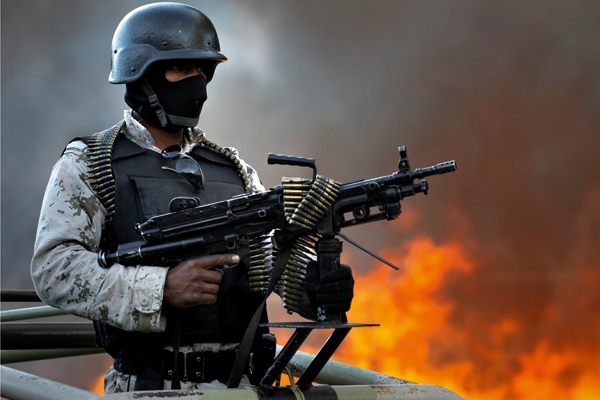‘They’re all bad, our politicians, all corrupt,’ said Maria, her cheery face dissolving into distaste. What about the new president, Peña Nieto? I ask. ‘That pretty boy? Ugh!’
It was late afternoon in Oaxaca’s central square, the Zocolo. Clouds were cruising in from the Sierra Madre and the dogs had begun to squabble and hump outside the cathedral. The news kiosk looked like a missing persons bureau, each front page full of mugshots: the latest victims of the drug wars.
What about Calderon, the one before Peña Nieto, I asked Maria, who’s seen ten presidents come and go. Wasn’t he OK? At least he tried to fight the drug cartels. ‘He’s loco! Mad,’ said Maria, with a dismissive shrug. ‘His so-called drug war — pah! Do you know how many have died in the drug war? They say 50,000 dead but it’s more like 100,000. It is more than died in the Vietnam war. And these are not soldiers, they are young boys, babies, mothers, husbands. And for what?’
There’s the question: for what? Felipe Calderon was once convinced he had the answer: to crack down on the kingpins; restore moral order. But Calderon’s war had a pretty clear outcome: the bad guys won. Capos were shot, but their cartels just split and proliferated: more gang warfare, more severed heads dumped on beaches; more corpses carved up and left on busy streets for kids to gawp at; extortion, kidnap, rape. It soon became clear even to Calderon that the ‘war on drugs’ was unwinnable, for the simple reason that the cause of the mayhem is not in Mexico, it’s in the States. For as long as there are American junkies, Mexico will pay the blood price for their addiction.
This has been the status quo for the past few decades, and as far as I could tell on my Mexican adventure last year, Maria was right: no one expected Peña Nieto to change much of anything. He belongs to the PRI — the Institutional Revolutionary Party, which ruled Mexico for most of the past century, and its approach to the cartels has been a blind eye.
But late last year, there was a new twist: America, having spent billions on Calderon’s daft crusade, last month voted to legalise cannabis in some states (if the federal government gives them the OK). Colorado and Washington started it, California is keen to follow suit, and Oregon, Rhode Island, Maine and Vermont aren’t far behind. It creates an irony that the Mexican president is puzzling over: some 40 per cent of the cartels’ business is selling cannabis across the border, so why should Mexico bust a gut keeping it from getting to America, if it’s legal there? This new legislation, said one of Peña Nieto’s advisers cautiously, ‘changes the rules of the game’.
It does, and it also creates an opportunity, though one that Peña Nieto might not welcome. If the Mexican president is brave enough, he could not just follow the new rules, but perhaps change the game. He could follow the lead of President Otto Pérez Molina of Guatemala, who has asked the question: if fighting doesn’t work, why not legalise drugs instead? Molina is a former head of the intelligence services who has himself tried the iron-fist approach to gangs, but now he says the price paid in human lives is too high. ‘It’s time to end the myths, the taboos, and discuss legalisation.’
Perhaps it sounds like a dramatic step. It’s certainly one America would oppose with every star and stripe, because to legalise drugs in Mexico would be to push the fight alarmingly close to their border. But then, even as a tourist there, you can see Mexico requires a dramatic step.
To say that the police aren’t effective is an almost comic understatement. It’s not just that there are good cops and bad cops; it’s that it’s impossible to tell the difference. Take this little tangle. Last year, in June, there was a shootout in the food court of Mexico City airport, Terminal 2. Three police officers who suspected another three of drug-smuggling went (they say) to make an arrest. The drug-running cops opened fire, killed the good cops, then skipped off scot-free, leaving clumps of traumatised Texan tourists shivering under canteen tables, vowing never to leave Dallas again. It later turned out that the runaway cops were in fact the good guys. They had been about to expose all the other cops as drug-smugglers, and had been shot at as a result. All 348 airport cops were later re-shuffled to other states.
If you think perhaps the answer to Mexico’s troubles is a tougher army, then I’d like to introduce you to Los Zetas. They are often also described as the paramilitary wing of the older Gulf Cartel, but that hasn’t been true for a while. In 2010 they bit off the hand that fed them, formed their own gang, and began to show their rivals the true meaning of brutality. The Zetas specialise in the butchering of children. They have been phenomenally successful, just recently overtaking the famous Sinaloa cartel and dominating the country. How have they managed this? Because they came from the army, from Mexico’s equivalent of the SAS. They were trained by American and Israeli special forces in intimidation, ambushing and marksmanship, just to fight the drug gangs. Then they upped and formed one. The Zetas still recruit from Mexico’s special forces and from the Guatemalan equivalent, the Kaibiles. The more cash America puts into training the Mexican army, the happier the Zetas are, purring over all the potential new recruits.
So there aren’t really many other alternatives. Why not legalise drugs? It wouldn’t be giving up, it would be winning without fighting — the best, cleverest way. The cartels would be forced above ground; the big money would be in legitimate business. The psychos, like Rosario Reta (opposite), would no longer be required, and who knows, the police might once again become an effective force.
After leaving Oaxaca, I headed for Veracruz state on the Mexican gulf and Maria waved us off with a warning: ‘Be careful, Los Zetas operate there!’ The next night was an anxious one, high in the Sierra Norte mountains, Googling for signs of trouble. The whole police force had been sacked recently, it turned out, and the Zetas were waging a war against journalists, leaving their beaten bodies in the streets as a warning to others. That was enough for me. At the turn-off to Veracruz the following day, we turned tail and made for safer-sounding Villahermosa, though I’m quite sure the chances of us actually meeting a Zeta were very slim.
And that’s another tragedy for Mexico. It’s a terrific place, but tourists are increasingly so paralysed with anxiety about the cartels that they’re reluctant to travel there. We ate alone one night in a three-storey restaurant in Mexico City on the main square — the one the Lonely Planet said was usually chock-a-block. Waiters idled by the walls, waiting to go home. A hundred tables laid in high season, and only two customers all night. If tourism dries up, there’ll be only one career for a young man with an eye to making money: join a gang.
President Peña Nieto is not a tough guy like Guatemala’s Molina. He will need help steeling himself to even consider legalisation. But perhaps he should look for inspiration at the official logo of Los Zetas. Along with a shield and a gun, they’ve included the drawing of a puppet-master’s hand, taken from the poster for Coppola’s Godfather movies. It’s two fingers up to the government: we really run the show. But it’s also the clue to what could be their undoing. If they’re up to speed with American gangster history, they’ll know that it was only by ending prohibition that America did for Al Capone.






Comments